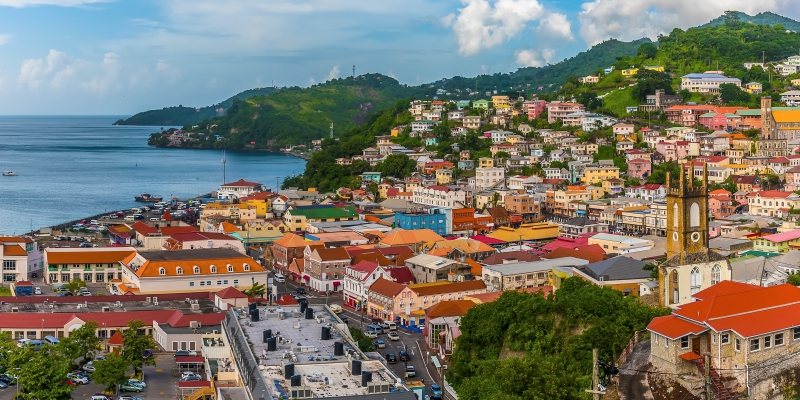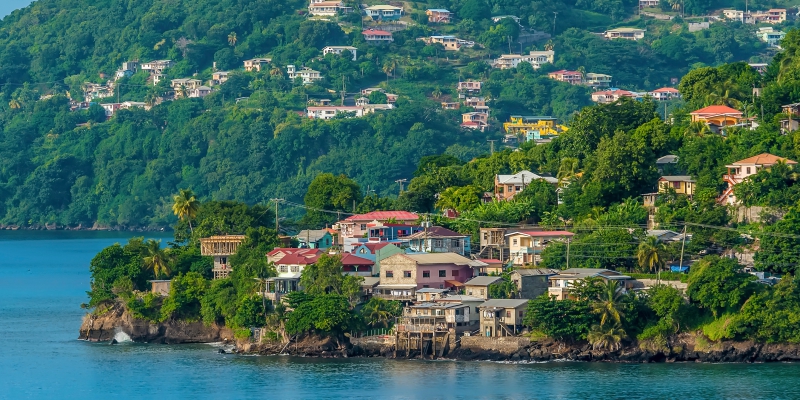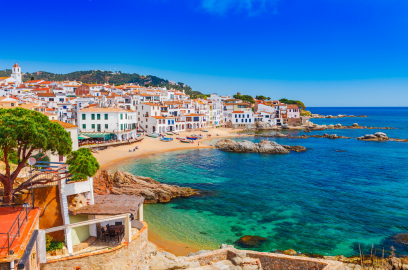Grenada is a safe harbour for living, tourism and investment

Grenada is a small island nation in the south-eastern Caribbean Sea. Grenada includes the island of the same name, the islands of Carriacou and Petite Martinique, as well as several more deserted stretches of land from the southern part of the ridge of volcanic islands known as the Grenadines.
Grenada is known around the world as a comfortable seaside resort with picturesque corners of pristine nature. In 2024, volcanic mountains, tropical forests with exotic birds, crystal clear sea and snow-white beaches of Grenada attracted more than 277 thousand tourists. In the first four months of 2025, the number of visitors to this wonderful country passed 299 thousand people.
Wealthy foreigners are attracted by Grenada’s investment citizenship programme – an opportunity to obtain a Caribbean passport for investing in the economy to freely cross the borders of 147 jurisdictions.
Entrepreneurs value Grenada as a safe tax haven, where international businesses are assured of confidentiality and a zero corporate tax rate on foreign-sourced profits.
Whatever your reason for visiting Grenada, you may be wondering how safe is the country? What challenges might those expats and investors who choose to settle in this tropical paradise face? What precautions will make your stay in Grenada safe? These and many other questions will be answered by the experts at Imperial & Legal in our article.

How safe is Grenada?
Grenada has a reputation as one of the safest countries in the Caribbean. The local population leads a measured lifestyle and is friendly to visitors from abroad. Local laws are aimed at promoting public safety and maintaining a warm and welcoming atmosphere, so Grenada is equally safe for all tourists: a group of cheerful students on holiday, a single girl and a large family with small children.
According to statistics, the most tourists come to Grenada from the United States and Great Britain. The State Department of the United States has rated the level of safety in this hospitable country so highly that it has recommended its citizens to limit themselves to normal precautions.
Unfortunately, this island nation becomes vulnerable to adverse weather conditions during the rainy season and tropical storms, as evidenced by the damage caused by Hurricane Berill in June 2024.
The Royal Grenada Police Force (RGPF) with over 900 personnel, the Coast Guard and emergency services play a special role in ensuring security on the islands.
Crime rates in Grenada compared to other jurisdictions
In 2025, Grenada was recognised as the safest country in the Caribbean region with a record low crime rate as measured by two parameters – the Security Index (75.78) and the Crime Index (24.22).
Grenada’s crime and safety indicators compared to neighbouring countries
| Location | Country | Security Index | Crime Index |
| 1. | Grenada | 75,78 | 24,22 |
| 2. | St Vincent and the Grenadines | 62,22 | 37,78 |
| 3. | Barbados | 55,14 | 44,86 |
| 4. | Antigua and Barbuda | 48,90 | 51,10 |
| 5. | Dominica | 46,42 | 53,58 |
| 6. | St Lucia | 37,52 | 62,48 |
| 7. | Dominican Republic | 39,54 | 60,46 |
| 8. | Puerto Rico | 38,69 | 61,31 |
| 9. | Trinidad and Tobago | 29 | 71 |
| 10. | Venezuela | 19,53 | 80,47 |
According to the Numbeo website, the safety of a solo walk in Grenada is rated as high at night and very high during the day. Simply put, in this country, a foreign tourist can safely walk almost anywhere, not just in the secured area of a hotel.
A brief analysis of crime in Grenada
The overall crime rate in this island nation is rated as low, although a slight increase (1.6%) in the number of crimes committed in Grenada was recorded in 2024.
| Offences | Level |
| Burglary | Low |
| Robbery | Low |
| Carjacking | Extremely low |
| Theft from a vehicle | Low |
| Violent behaviour | Extremely low |
| Insult | Low |
| Physical assault motivated by racial, ethnic, religious or sexual animosity | Extremely low |
| Theft of property and vandalism | Low |
| Violent offences – robbery and armed robbery | Low |
| Corruption | Low |
The RGPF mainly records petty theft of property, sexual offences, and firearms trafficking offences. According to official statistics, violent crime is extremely rare in this jurisdiction, especially against tourists and visitors.
Most often foreigners encounter petty theft of personal property in tourist areas, at public events, on the beach and at the harbour. Mostly stolen items left unattended, or property lying in plain sight in a car.
As Grenada is a small country with a relatively large and, importantly, professional police force, the crime detection rate is 74.8%.
Safety precautions for tourists and expats
Grenada is a safe and peaceful enough country to be overly vigilant. However, some basic precautions are guaranteed to keep you out of trouble:
- Always lock the front door of your hotel room, apartment or rental property. The same advice applies to travellers who live on a yacht.
- Keep valuables and documents in a hotel safe or use a safe deposit box at a local bank.
- Carry a charged mobile phone with roaming charges or a SIM card from a Grenada operator. Memorise your phone with numbers to call the local police and emergency services.
- Although it is safe to walk in this country, try to avoid walking alone at night in deserted areas. Do not wear provocative clothing. Remember that even children are not allowed to wear camouflage colours in Grenada.
- Be especially careful in crowded places – street and beach parties, music festivals, especially when it gets dark.
- Do not get into a car with strangers. Use only licensed taxis.
- Do not carry valuables or large sums of cash.
Transport safety in Grenada
Travelling by car in Grenada can be a quick and convenient way to explore the country’s secluded corners. However, before you rent a car, you should familiarise yourself with local traffic laws to avoid getting into an accident and avoid interaction with the police. Like most Caribbean countries, traffic here is left-hand drive.
If you do not have an international driving licence, you will need to obtain a provisional driving licence from the nearest police station before getting behind the wheel.
The island of Grenada has well-maintained tarmac paved motorways. However, as you get further away from St George, you will increasingly encounter secondary or rural roads, which can be narrow and poorly lit, with steep climbs and blind corners. Be especially careful when driving at night!
Grenada also has public transport with 9 bus routes. If you need a taxi, use only licensed services with good references.
Grenada is in the range of the infamous tropical hurricanes. Foreigners who have made this hospitable country their second home need to keep an eye on the weather during the rainy season for safety reasons and refrain from travelling by car if a natural disaster is forecast.

Grenada’s natural and climatic risks
Although Grenada has warm weather all year round, it is sometimes prone to natural disasters. The rainy season comes to the islands in June, and the weather is bad until the end of November. This period is characterised by high humidity, heavy downpours and tropical storms. Hurricane season is usually between August and October. Grenada is south of the “hurricane belt” and, as a rule, the elements bypass it. But sometimes a hurricane hits the islands. The devastating hurricane Beryl came in June 2024 and caused such damage to the tourist infrastructure of Carriacou and Petite Martinique islands and the northern part of Grenada that after one year reconstruction works have not yet been completed there. The country was hit by Hurricane Ivan in 2004 and Hurricane Emily hit Grenada in 2005.
Tourists rarely come to this country during the rainy season. And those investors, entrepreneurs, retirees and digital nomads who stay in Grenada usually insure their property, keep an eye on weather forecasts and try not to miss emergency alerts.
Medical safety and vaccinations in Grenada
Grenada has a high standard of medical care, but hospitalisation, treatment and evacuation to another country can be very expensive if you do not take care to purchase medical insurance to cover the costs.
There are many private and public hospitals on the island of Grenada, the largest and best equipped being St George’s University Hospital and Princess Alice Hospital. On the island of Carrioca, the most common place to seek care is the Princess Royal Hospital. In an emergency, you can call an ambulance.
As you are travelling to a tropical country where there has long been no universal vaccination of the population, you need to be immunised against the following diseases:
- polio;
- diphtheria;
- rabies;
- hepatitis A;
- hepatitis B;
- measles;
- rubella;
- tetanus;
- whooping cough.
All tourists and expats in Grenada need to follow some simple food and drink recommendations. As they are in a country with a tropical warm climate, they should never eat street food in cheap cafes where high sanitary standards are not maintained. Raw food should be washed thoroughly before consumption or cooking. The quality of Grenadian water from central water supplies is high enough to use for cooking. For drinking, use bottled water sold in grocery shops.
Details of the Grenada Citizenship by Investment Programme
In its current form, the Citizenship by Investment Programme (CIB) was launched in 2013. Citizenship is granted to wealthy foreign nationals for a significant economic contribution to the development of the country, or for the acquisition of an asset approved by the authorities. All applicants are thoroughly vetted by a government department before a favourable decision is made.
Through the passport programme, the Government of Grenada encourages the construction of new tourism infrastructure, as well as directs grants from foreign investors to diversify the national economy.
Investment Options
- Donation to the National Transformation Fund (NTF). The amount of the non-refundable donation to Grenada’s NFT must be at least$ 235,000 if a single investor or a family of up to 4 persons is applying for citizenship. Further increase in the number of dependents in the application leads to an increase in the donation amount:
Additional dependent By how much will the donation amount increase? Minor (not a sibling) $25 000 Adult (not a sibling) $50 000 Brother or sister $75 000 - Purchase of at least $270,000 worth of property in a government-approved project, plus an additional non-refundable fee of $50,000 for a single applicant or a family of up to 4 people.The minimum holding period for an investment property is 5 years, after which it can be sold. As a rule, foreign investors are offered to make a contribution to the construction of one of the approved resort complexes. The amount of investment in some approved projects in Grenada may be more than the established minimum.
Requirements for programme participants
- The main requirement is that the applicant has enough money to make the investment and pay any additional fees.
- Only investors of legal age can participate in the programme.
- It is important that the investor and his or her dependents over the age of 17 do not have criminal convictions and are not under trial.
The main advantages of the Grenada investment programme are
- Ability to visit 147 independent jurisdictions without a visa or with a visa on arrival, including the UK, Schengen countries, Russia, China, Hong Kong and Singapore.
- Tax optimisation. Tax residents of Grenada pay no tax on inheritance, capital gains or foreign earned income.
- Grenadian citizens have access to a prestigious E-2 US visa, which allows them to live, study, work and do business in the United States for several years.
- Participation in the programme remains secret, which is important for investors from countries where multiple citizenship is prohibited.
- To obtain citizenship for investment, a wealthy foreigner does not need to learn the language, pass exams on knowledge of the local culture and come to Grenada.
- Economic citizenship can be inherited. Moreover, in addition to spouse and children, the investor can add to his application: unmarried brothers and sisters, as well as parents and grandparents over 55 years of age, both his own and his wife’s.
- Speed of processing. Usually, a participant in the Grenada passport programme is granted a second citizenship within 3-4 months.
Is it safe to participate in the Grenada investment programme?
CBI is absolutely safe for investors. Moreover, it is not uncommon for foreign investors to participate in the Grenada passport programme in order to avoid unfair prosecution in their home country, as well as to provide stability and security for their family in their new location.
By investing in Grenada’s economic development, a bona fide investor is guaranteed a second citizenship:
- Interaction with Investment Migration Agency Grenada is carried out only through licensed agents of the programme residing directly in the country. Our representative on the island is such an agent, which allows us to process our clients’ applications in the most efficient manner.
- If island property is being purchased for second citizenship, the investor will only be offered projects approved by the authorities from bona fide developers. Our representative in Grenada will be able to assess all properties on site to find the most favourable option.
Why do investors move to Grenada?
Of all the Caribbean jurisdictions with investment programmes, only Grenada can offer such a high level of security. The country compares favourably with its neighbours in terms of low street crime rates, political and economic stability, quality medical care and the opportunity to get a good education at a local university.
Enterprising foreigners find in Grenada a soft tax regime, state support for business and the main advantages of a classic offshore zone.
And of course, one cannot ignore the beautiful nature of the islands that make up Grenada. Outdoor enthusiasts appreciate this country for its unique volcanic mountains, pristine white sand beaches, tropical forests with exotic birds and numerous hiking trails – an inexhaustible source of new impressions.
Make an appointment for a consultation with Imperial & Legal specialists. Our lawyers will help your family to obtain investment citizenship and organise a safe move to Grenada.


